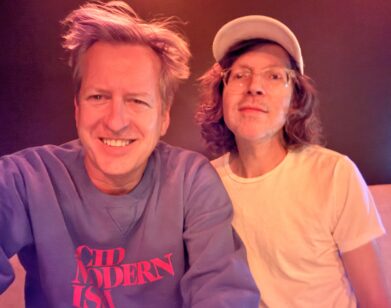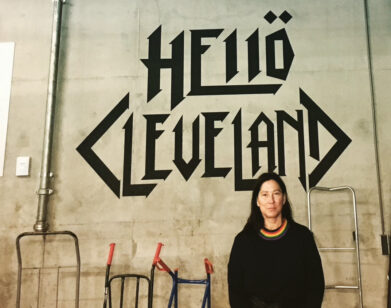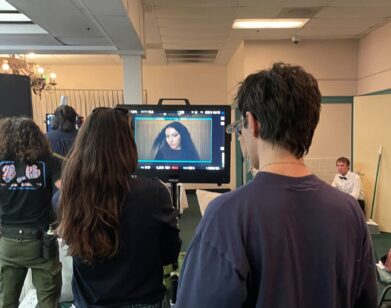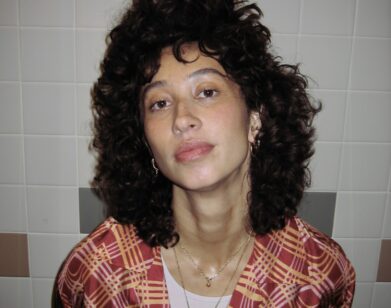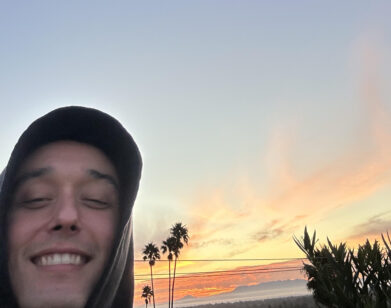Joss Stone Has It Covered
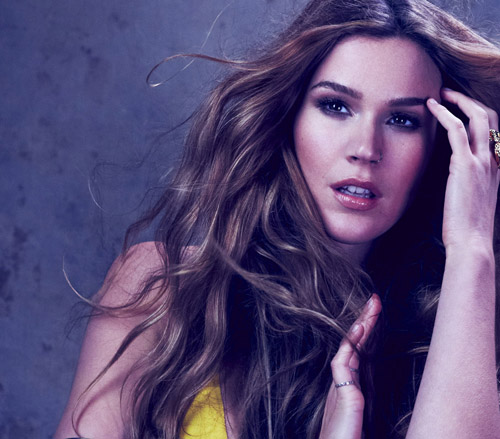
IMAGE COURTESY OF DAVID VENNI
The brand-new music video for Joss Stone’s single “The High Road,” below, is an apt metaphor for the free-spirited, Grammy Award-winning, sultry singer herself: It’s a little bit old-school, full of soul, and ultimately focused on the music. Spontaneous Stone, who can record a brilliant album in a matter of days, told us that the way she records is pretty simple: “Mic everyone up, plug ’em all in, and fuckin’ jam. That’s it. Have a good time!”
In 2003, at the tender age of 15, Stone burst onto the international music scene straight out of the UK with The Soul Sessions, an album of cover songs from the 1960s and ’70s—and a memorable, unique soul rearrangement of The White Stripes’ “Fell in Love With a Girl.” Since her debut, Stone, who sips tea between songs and performs barefoot, has shared the stage with soul legends, filmed a sex scene with Jonathan Rhys Meyers on The Tudors, and became a member of SuperHeavy, the bombastic super group featuring Stone, Mick Jagger, Dave Stewart, Damian Marley, and A.R. Rahman.
Six albums later, Stone electrifies again with the sequel to her debut, The Soul Sessions Volume 2, out July 31st as a collaboration between her own label Stone’d Records and S-Curve Records. The album includes 11 soul covers and in June was previewed at The Highline Ballroom to sold-out audiences. We met with Stone at the Maritime Hotel and talked about the new album, health care, James Brown, and the time she cried to an Eric Clapton song.
MADISON MOORE: You debuted at the age of 15 with The Soul Sessions, an album of soul covers. Six albums later you’re releasing the sequel, The Soul Sessions Volume 2. How did you decide to revisit the cover album concept?
JOSS STONE: I was no longer with EMI, and after I left that label, I decided to do everything based on how fun it’s going to be. When you have the opportunity to make music with great musicians, take it. That’s it. That’s the only reason I need, really. So I thought, well why not? Sounds like a laugh—let’s go! I don’t have to write anything, it’ll take me two weeks. And to be honest, those songs are much better than the songs I can write, shit.
MOORE: It’s been almost 10 years since The Soul Sessions, so doing The Soul Sessions Volume 2 seems like a nice bookend to everything you’ve accomplished. What have you learned in the space between those two records?
STONE: I learned to make music. Before, on the first album, I didn’t make music. I was just a singer, and I wasn’t even really a singer. I didn’t even know how to sing.
MOORE: Well, I’m not so sure anybody would agree with that.
STONE: No really, I would sing my voice away. I would sing for 30 minutes and that would be it, that would be me, done. Because I didn’t know what I was doing, I was just trying to make the noises. The one thing I could do was be in tune and make people feel something.
MOORE: It’s true, there’s such emotional urgency when you sing, especially on a song like “The High Road.” Were you a sensitive child?
STONE: When I was six, my dad played me an Eric Clapton song [“Tears in Heaven”]. He goes, “Joss, this song is about Eric Clapton and his son. His son fell off a balcony and died and he was two.” I listened to the song and I could not stop crying for days! And my mother, oh, my God, she was so pissed off with him. “How you gonna play that song! Our emotional child! She’s destroyed!” I’ve always been that way. If I feel something, whether it’s love or anger or anything, you’ll know it.
MOORE: You seem committed to the music without any artifice. We’re in this moment in pop culture where everybody has to have an image and put on this big performance—
STONE: And that’s quite fun to do. I like to dip in and out of all sorts of different things. God, if I was asked to be in a show, like a real show, I would be so up for doing that.
MOORE: But you were on The Tudors!
STONE: Yeah! Oh, my God, I loved that, and that’s not music and that’s not spontaneous. You learn your lines, you feel it, you go.
MOORE: “(For God’s Sake) Give More Power to the People” is a cover of a song by the The Chi-Lites from 1971, with a strong political message. Is there any reason you chose to cover it right now?
STONE: Well, obviously at this time, it’s a real time for it. The recession is everywhere. We need to be heard. Wouldn’t it be great if there could be more referendums so we could have regular voting on specific points? Like the health care here, man. What the fuck? Honestly?
MOORE: It’s a mess. Conservatives are busy trying to repeal the health-care law. I think the Supreme Court is voting on it soon.
STONE: I live in a place where we have health care and anyone can get health care, and it works out just fine. It might not be the best health care, it’s not private. But to send people out that can’t pay? “I’m so sorry that you’re dying, but could you just die a bit further away from our practice?” Fuck off. What is that all about? So “For God’s Sake” was relevant in 1971, and it’s still relevant today. We should have a say, and to have a couple songs [on the album] that say that is important to me.
MOORE: How did you decide which songs to cover? Do you keep a big notebook of all your favorite soul artists?
STONE: What’s funny is that there was a big argument about whether we were going to do The Soul Sessions, because I was writing before that. To say to a young artist writing songs, “I’d like you to do an album of covers,” it wasn’t really the right thing. But at the end of the day, I was a little girl and I would do anything. When you get your first record deal, you will do anything, because you just want to sing. So we did it, and it worked out great, and I got to do my writing on Mind, Body & Soul.
MOORE: You were one of the last people to perform on stage with James Brown. What was that like?
STONE: I’m so lucky. I was on this TV show in England [Friday Night with Jonathan Ross]—I sang to James in the Kennedy Center Honors—and then he was on the same talk show in England. About two weeks before they said, “Would you like to sing with James on the show?” and I said, “Yeah, definitely.” And then they come back and go, “Actually, we’re not doing that anymore.” So I didn’t learn it. I got there, did my interview, went backstage to watch James’ interview. Jonathan—cheeky bastard, right?—he goes, “James, Joss is backstage.” And he goes, “Oh yeah, Joss Stone, yeah.” He goes, “So, do you want to sing with Joss?” And I was like fuck! And James goes, “Yeah! Yeah, definitely. We’ll get Joss out.” Are you serious? I have had no time to prepare, I have to sing in front of the UK, with James Brown, making this shit up.
MOORE: Wow, that must have been an amazing experience!
STONE: Yes! And then there was another event I went to, and James comes up to me and he’s like, “Do you wanna make some real funk music?” I go, “Yeah, all right!” And then he goes, “Okay, we’re going to make a record next year, in January, me and you.” I thought, there’s no way James Brown was going to make a record with me. And then his manager comes up to me afterward and is like, “He’s absolutely serious.”
JOSS STONE’S SOUL SESSIONS VOLUME 2 IS OUT JULY 31. FOR MORE ON THE ARTIST, VISIT HER WEBSITE.


